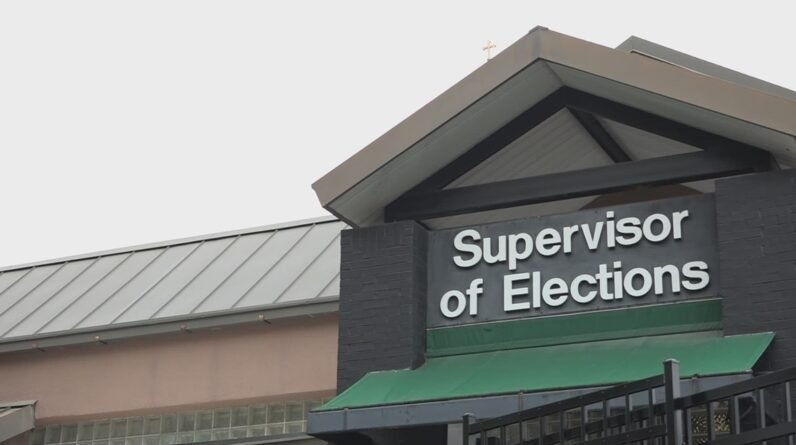
The spending has been largely substantiated, but the question remains of how such an oversight occurred.
JACKSONVILLE, Fla. — More than $138,000 in spending went undocumented for three years in the Supervisor of Elections Office, a recent Jacksonville Inspector General report found.
Almost entirely legitimate office spending, the amount came from a purchase card (otherwise known as a “p-card”) that neither supervisors nor the city’s accounting department flagged until years after the holder stopped documenting the transactions.
The spending has been largely substantiated, but the question remains of how such an oversight occurred. The Inspector General’s office has so far not found any similar occurrences in other city offices, though they have not concluded their overall review.
The card was used to pay for the Supervisor of Elections business, but the proper documentation was never filed to verify each purchase, according to the report. Responsibility for the oversight extends from the individual card holder to the city itself for not implementing its own checks-and-balances authority, the offices involved agreed.
“It starts internally with them [the Supervisor of Elections Office],” Derrone Nins, the Inspector General investigator who wrote the report, told the Times-Union. “I think, you know, for them to make sure that these things don’t happen in the future, that management does have to do their part so that the employees don’t fall short of the city policies and procedures.”
The report identified Robert Phillips, a Supervisor of Elections employee of 32 years, as the responsible p-card holder. Phillips retired in June 2023 but returned in July as a part-time special assistant. The newly elected Supervisor of Elections Jerry Holland told the Times-Union he knew of the p-card discrepancies when he asked Phillips to return and that purchases were not fraudulent.
Phillips said he was never trained on how to document the purchases after the city changed processing systems.
“I never had anything to hide, you know what I’m saying?” Phillips told the Times-Union. “I was never really concerned that we had done anything wrong. Maybe it was against policy, but we never did anything illegal.”
How did $139,000 go undocumented?
City p-cards act as a credit card, so the transactions clear with each use. But, city policy requires all p-card holders to submit their receipts and verification materials for purchases every 30 days. Their supervisors are then required to review the expenses and return them to the division coordinator for storage.
Phillips’ p-card expenses were unverified through the city’s process standards from March 2020 to December 2023, according to the Office of Inspector General report. All purchases, with the exception of $138 in accidental personal purchases, have now been reconciled.
Phillips previously uploaded the company card to his PayPal account to pay a vendor and did not remove it, which resulted in the accidental purchases, he said. He is waiting for the city to tell him how to best pay back that money, he said.
“Then when I noticed I had some PayPal expenses, because I guess it just defaulted to that card, I took it off immediately,” Phillips said. “I fully admit that those are expenses that I owe the city, so I have absolutely no problem in paying them back.”
The city changed purchasing systems in February 2020, one month before the COVID-19 pandemic sent workers to their homes. The new system, 1Cloud, fell to the wayside, Phillips said.
He followed city procedure prior to the switch, but never received training on the new system, Phillips said. Between the pandemic changes and the 2020 presidential preference primary schedule, Phillips continued making purchases on the office’s behalf but failed to document them, he said.
“So a lot of these expenses came in fast and furious about things we had to purchase that we hadn’t already planned on purchasing, and the easiest, fastest way to get it done was just to use the p-card,” Phillips said.
He said he talked with Mike Hogan, his direct manager and supervisor of elections at the time, regularly about the expenses and ensured the office kept on budget.
Hogan did not respond to the Times-Union request for comment.
The city changed purchasing systems in February 2020, one month before the COVID-19 pandemic sent workers to their homes. The new system, 1Cloud, fell to the wayside, Phillips said.
He followed city procedure prior to the switch, but never received training on the new system, Phillips said. Between the pandemic changes and the 2020 presidential preference primary schedule, Phillips continued making purchases on the office’s behalf but failed to document them, he said.
“So a lot of these expenses came in fast and furious about things we had to purchase that we hadn’t already planned on purchasing, and the easiest, fastest way to get it done was just to use the p-card,” Phillips said.
He said he talked with Mike Hogan, his direct manager and supervisor of elections at the time, regularly about the expenses and ensured the office kept on budget.
Hogan did not respond to the Times-Union request for comment.
Holland changes p-card holders, Inspector General makes recommendations to remedy
Holland, the newly elected supervisor, said he had full confidence in Phillips, and he planned to keep Phillips in his current part-time role.
“I didn’t see him in a sense misuse the card,” Holland said of the results of the investigation and why he asked Phillips to return to the office. “It was just, again, the accountability required on him and the office was what fell short.”
He discovered the p-card problems prior to taking office when he requested staff to begin identifying all purchases. Phillips retired in June, returning his p-card, after Holland began helping him piece together the records.
A warehouse manager also used a p-card, but those expenses were reconciled before Holland took office.
Now, the office’s chief financial officer, a position Holland hired in his previous role as property appraiser and brought to the supervisor’s office, holds the only p-card. She does not loan it to others to use it for office purchases, as the previous administration allowed, Holland said.
Holland said he reviews the spending each month, but the goal is to know about spending far enough in advance to clear a check.
He said the office accepted responsibility for the p-card issues but believed the city shared culpability for what happened because of how heavily each part of the consolidated government relied on human resources and accounting.
The Supervisor of Election staff never learned the new system, he said.
“We had the same system in the property appraiser’s office, and it was something you had to take the time and effort to learn,” Holland added. “But the city could’ve either provided training or stopped the use of the card. They as much are culpable in the sense that they let it continue.”
The Inspector General’s office recommended both the supervisor and the city take restorative action moving forward, including largely ensuring the correct process for documenting purchases is explained and only a certain number of affidavits are allowed per employee — to encourage maintenance of original receipts.
The city did not respond to an interview request by the time of publication, but the mayor’s office said it would release its recommendations after all purchases were recognized. Nins said he appreciated how seriously the city has taken the issue
“I think the recommendations that we have to put in place will deter those from happening, but also to give us some proactivity,” Nins said. “If we see it come up again, we’ll know how to move forward to get these things rectified quickly, so things don’t happen for years at a time like Mr. Phillips. I think this is a rare occasion. However, we want to be as proactive as we can to make sure these don’t happen again.”
This story was previously published by the Florida Times-Union.







